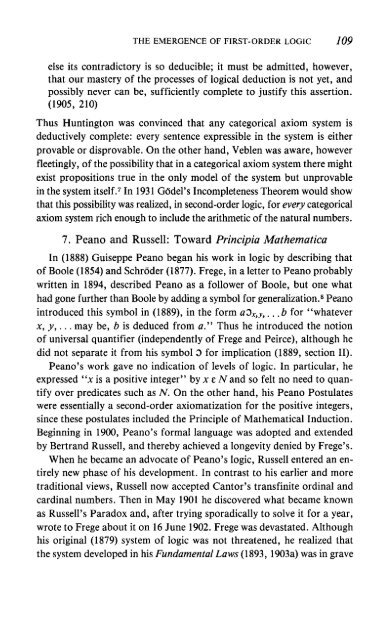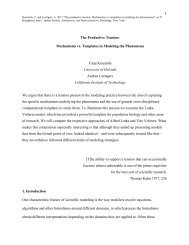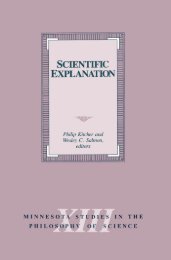The Emergence of First-Order Logic
The Emergence of First-Order Logic
The Emergence of First-Order Logic
You also want an ePaper? Increase the reach of your titles
YUMPU automatically turns print PDFs into web optimized ePapers that Google loves.
THE EMERGENCE OF FIRST-ORDER LOGIC 109<br />
else its contradictory is so deducible; it must be admitted, however,<br />
that our mastery <strong>of</strong> the processes <strong>of</strong> logical deduction is not yet, and<br />
possibly never can be, sufficiently complete to justify this assertion.<br />
(1905, 210)<br />
Thus Huntington was convinced that any categorical axiom system is<br />
deductively complete: every sentence expressible in the system is either<br />
provable or disprovable. On the other hand, Veblen was aware, however<br />
fleetingly, <strong>of</strong> the possibility that in a categorical axiom system there might<br />
exist propositions true in the only model <strong>of</strong> the system but unprovable<br />
in the system itself. 7 In 1931 Godel's Incompleteness <strong>The</strong>orem would show<br />
that this possibility was realized, in second-order logic, for every categorical<br />
axiom system rich enough to include the arithmetic <strong>of</strong> the natural numbers.<br />
7. Peano and Russell: Toward Principia Mathematica<br />
In (1888) Guiseppe Peano began his work in logic by describing that<br />
<strong>of</strong> Boole (1854) and Schroder (1877). Frege, in a letter to Peano probably<br />
written in 1894, described Peano as a follower <strong>of</strong> Boole, but one what<br />
had gone further than Boole by adding a symbol for generalization. 8 Peano<br />
introduced this symbol in (1889), in the form a3x>y,.. .b for "whatever<br />
x, y,... may be, b is deduced from a." Thus he introduced the notion<br />
<strong>of</strong> universal quantifier (independently <strong>of</strong> Frege and Peirce), although he<br />
did not separate it from his symbol D for implication (1889, section II).<br />
Peano's work gave no indication <strong>of</strong> levels <strong>of</strong> logic. In particular, he<br />
expressed "x is a positive integer" by x e TV and so felt no need to quantify<br />
over predicates such as N. On the other hand, his Peano Postulates<br />
were essentially a second-order axiomatization for the positive integers,<br />
since these postulates included the Principle <strong>of</strong> Mathematical Induction.<br />
Beginning in 1900, Peano's formal language was adopted and extended<br />
by Bertrand Russell, and thereby achieved a longevity denied by Frege's.<br />
When he became an advocate <strong>of</strong> Peano's logic, Russell entered an entirely<br />
new phase <strong>of</strong> his development. In contrast to his earlier and more<br />
traditional views, Russell now accepted Cantor's transfinite ordinal and<br />
cardinal numbers. <strong>The</strong>n in May 1901 he discovered what became known<br />
as Russell's Paradox and, after trying sporadically to solve it for a year,<br />
wrote to Frege about it on 16 June 1902. Frege was devastated. Although<br />
his original (1879) system <strong>of</strong> logic was not threatened, he realized that<br />
the system developed in his Fundamental Laws (1893, 1903a) was in grave




